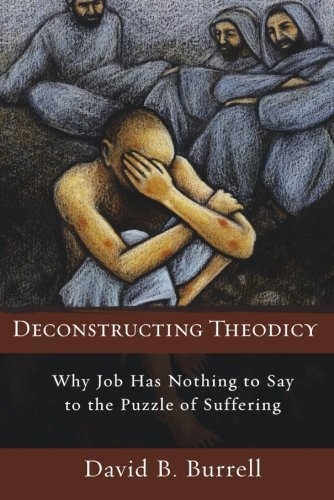David Burrell: Deconstructing Theodicy
 David B. Burrell, Deconstructing Theodicy: Why Job Has Nothing to Say to the Puzzle of Suffering (Brazos, 2008), 144 pages, ISBN 9781587432224.
David B. Burrell, Deconstructing Theodicy: Why Job Has Nothing to Say to the Puzzle of Suffering (Brazos, 2008), 144 pages, ISBN 9781587432224.
How can a Good God allow evil to happen? This question has troubled philosophers and theologians for millennia. In this book by David Burrell, Professor of Philosophy and Theology at the University of Notre Dame, he takes up the problem of theodicy by looking at the Book of Job. For a majority of the Contemporary Era, many have found Job to be a valuable resource from which they can derive solace. Burrell somewhat challenges this idea, however, contending that there is not much of an explanation of suffering within Job, nor was there meant to be. On the contrary, he stipulates that the Book of Job belies the idea that if we are good in our actions, that God will bless us, and that when we sin God will punish us. The point of the Book of Job, he says, is to stress how essential one’s relationship with God is to deal with—and ultimately endure—the suffering that is inevitable in life. Indeed, despite our desperate questions, there is no adequate reason for why people suffer.
The book is comprised of eight short chapters, the first of which introduces the reader to Burrell’s methodology. The second, third, and fourth chapters analyze the structure of Job, how it centers around the three rounds of discourse between Job and his “friends.” Chapter five is an interfaith perspective by Islamic scholar A. H. Johns on the reading of the person of Job in the Koran. Burrell then interacts with classical—medieval—commentaries on Job, which constitutes the sixth chapter, followed by the seventh chapter which deconstructs the idea of “justifying ways of God” to people. Burrell concludes the text by showing that the story of Job indicates that there is truly no “distance” between the created and the Creator. Although the Creator is distinct from creation and his creatures, there is a definite relation between them.
Although geared toward an academic audience, many pastoral applications can be gleaned from the text. Therefore, this book should be read by all Christians who seek to minister to the saints. The most remarkable aspect of the Book of Job, according to Burrell, is that God both listens to and answers Job. We should take comfort in the fact that God interacts with his creatures. The God of Christian theism is not a detached entity.
Reviewed by Bradford McCall
Publisher’s Preview of Deconstructing Theodicy: http://assets.bakerpublishinggroup.com/processed/book-resources/files/Excerpt_Burrell_DeconTheo.pdf
GoogleBooks Preview: books.google.com/books?id=rkeLcVLdF9cC
Category: In Depth, Winter 2010


